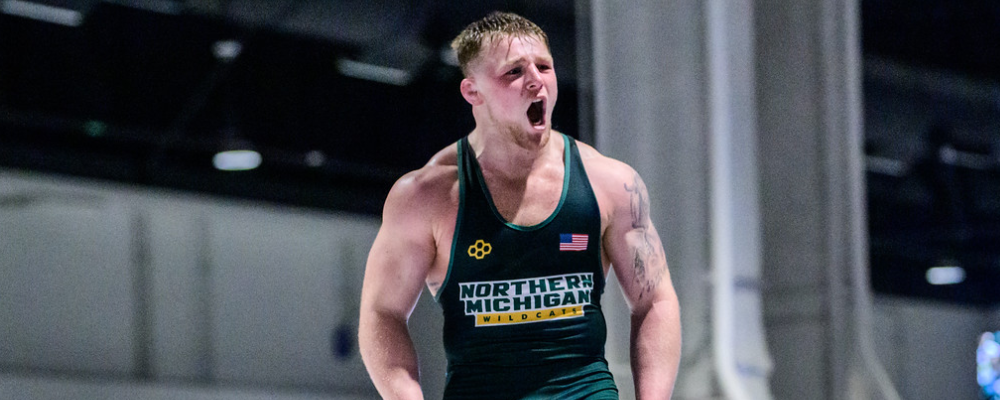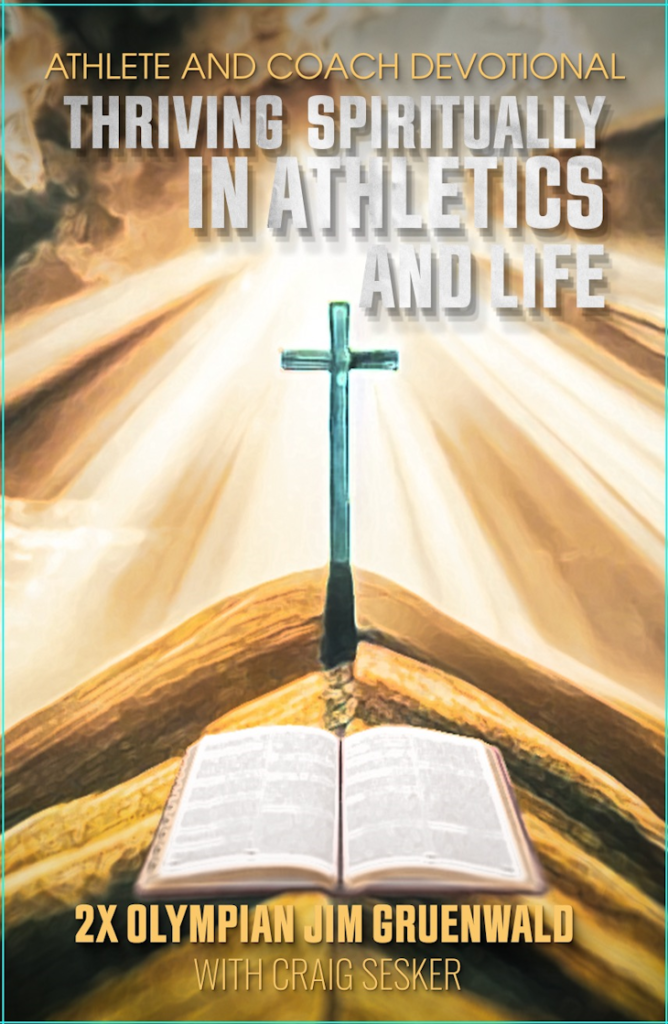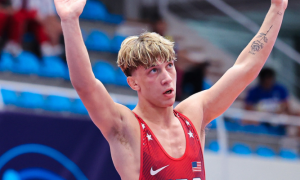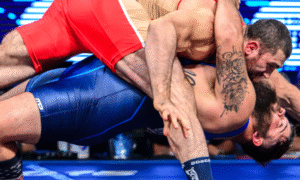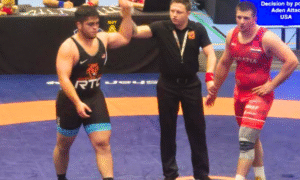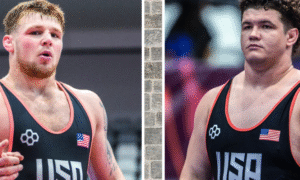The idea was to skim through a few topics having to do with the 2025 World Team Trials, maybe ask a question or two about the impending Pan-American Championships, and highlight NMU’s overall presence in Las Vegas but focus more on how the program continues to gel thanks to outstanding leadership and a collection of dedicated and supportive athletes. And, by and large, all of that got accomplished when speaking with ’24 Olympian Payton Jacobson (87 kg, NYAC/NTS) on Monday night, just as he was finished with, or close to finishing, packing for the next day’s trip to the aforementioned Pan-Ams (in Monterey, Mexico beginning Thursday).
But the thing with Jacobson is that, when he does interviews on this platform, he becomes more comfortable if the topics go a little deeper into the nuances of Greco-Roman wrestling. I had told him that the outline was more of a broadbrush approach and just a few questions. The way I had put it, I wasn’t interested in “rehashing” any of the post-Trials bulletpoints that might have been hit in his other interviews following what, for him, was another hard-fought, thrilling three-round series victory against two-time World Team member Spencer Woods (Army/WCAP). Just the basics and move on — that was the original protocol when we connected. It was the night before Jacobson was set to depart past the Southern Border, and so delving into a marathon of dialogue did not seem prudent. I had even informed him earlier in the day that if he were too busy packing, then we would just punt it until next week or something. But, of course, Jacobson made himself available, anyway. He is too respectful, too well-mannered to take these things for granted. Plus, he knows the deal. He knows that we all have to work together on trying to create awareness around this special, but oft-neglected, style of wrestling inside of the US.
That is why it almost feels like he got shortchanged in this piece. Because as soon as the conversation shifted towards an area in which he could actually get in the weeds a little bit technically and tactically, he was in his wheelhouse. Jacobson senses that, despite his young age (22), people might hang onto the things he has to say, but he is already used to the brunt of common questions wrestling media types tend to throw at him. Those, he answers like a pro, akin to any MLB or NFL player. He can do that all day, though he will also make sure to slam home various points he feels are important to make. So, you have to engage him with more depth. Jacobson enjoys and desires discussing this sport like a sport. Similar to two-time Olympian Ildar Hafizov (Army/WCAP), he wants you to come with specificity, that way he has an opportunity to expound upon particular techniques and strategies, and to explain how he might have arrived to certain in-match decisions that — by all appearances — made crucial differences in outcomes. Jacobson prefers this direction because he loves Greco, and because he fully grasps the importance of an ongoing education in this country when it comes to the classical discipline.
Therefore, readers of this Q&A will hopefully be pleased. Jacobson — who in ’24 was voted 5PM’s Co-Athlete of the Year along with Beka Melelashvili — goes into detail on each item presented to him, such as the meaning behind him having just made his second-straight Senior World-level roster, how he felt coming off of an injury-induced layoff, the hectic moments leading to his series-clinching bodylock against Woods, and how he is approaching the Pan-Ams. However, and as you may notice, Jacobson brightens up the most when talking about the progress and culture found at NMU. His roommate and fellow ’25 World Teamer Max Black (60 kg, NYAC/NTS) sprinted with that torch in his own Q&A released on Tuesday, and Jacobson couldn’t wait to pick up where Black had left off. One thing no one can escape about NMU at the moment is that virtually every single Greco-Roman student-athlete from the school is compelled to publicly lift each other up, as well as the coaches. This is likely due to how they all function together privately. Black said, “We’re a family”, and Jacobson echoes that same sentiment, just with a touch more edge and an emphasis on accountability.
That, he cannot help. Jacobson runs towards, and embraces, accountability. Being accountable orients his attitude, and his attitude influences his competitiveness. If there is a standard to which Jacobson is holding himself, he expects everyone around him to be on the same page. It’s what works for him. It is how he thrives. And it is why his leadership as an athlete has NMU potentially on the brink of another golden era.
Payton Jacobson — 87 kg, NYAC/NTS
5PM: Being that you were coming off of an injury and rehab, and hadn’t been able to compete since the U23 World Championships, was there any apprehensiveness prior to the tournament? Or were you 100% physically, mentally, emotionally, and so forth?
Payton Jacobson: Honestly, I felt the best I’ve ever felt. Before getting the surgery, I was trying to stay in the best shape I could so that it would not deter me too much. I knew with getting the surgery that I would be down for a bit and that I wasn’t going to be able to work out. Once I got the surgery, I was chilling for a bit — but as soon as I could, I was working out again. It made me get a lot stronger within my legs because I couldn’t work out with my upper-body. It really made me focus on being a leader in the room rather than just putting my head down and wrestling. It really helped me coaching-wise a little bit and with helping out guys in the room. There was a lot of growth for me, so I think it really was a good thing for me.
5PM: I had asked Ellis (Coleman) a question similar to this, but what is it that you learn by helping coach guys in the room? How does coaching influence your own training?
PJ: For one, I kind of realized that there are other things outside of wrestling. I could focus on being a Christian more, figuring out what I am trying to do in this life. One thing that I really noticed up here, with people following me, is that I am an inspiration to them a little bit. That is one thing that really pushes me. And two, it helps me focus on techniques because I have to explain them more as opposed to just feeling them out myself. I had to really explain things because I wasn’t able to wrestle at all for a little bit.
I would work out before practice and I was able to be in the room while practice was going on and help out other guys on the team. And I think that actually made a difference. For guys who had actually been hurt, they knew that they had to be working on the side, as well, or getting a workout in themselves. I feel like they see the results that I have and see that goals they want to strive for are achievable so long as you really put the work in.
That is one special thing that we have up here. Me making the Olympic Team was just the beginning. Now we have Max (Black) on the World Team, we’ve got Kaden Ercanbrack on the U23 World Team, Landon (Drury) is on the U20 World Team, and now we have Otto (Black) up here, as well. It is just creating a big ripple effect from not only what I’m doing, but also what all of my teammates are able to do around me. We all bring each other up. That is one of the biggest things my injury has taught me, that I can do things outside of just making myself better. I can get other people going, as well, and I think that we are going to see a lot more results because of it.
5PM: You made the Olympic Team, now the World Team, which means your second Senior World-level roster. I’ve asked other athletes this before, what it’s like making a second Team in a row. In this case, you had also come off of injury. If at all, how did making this Team compare to your making the Olympic Team last year?
PJ: Last year, I feel like it was not as much of a surprise to me but it was a surprise to other people. Then I felt like a lot of people were hyper-focused on me, and rightfully so because it was such a big year. I mean, it’s the Olympic Year and I didn’t know the best steps to take training-wise. I was messing up in practice a lot and I felt like I wasn’t getting as good as I should be to get ready for the Worlds. One thing is, when I was in Croatia, I was talking to Turpal (Bisultanov) a little bit and he told me that if you’re having the perfect practice every practice, then you’re not in the right spot. So one thing me, Andy, and Parker have been working on is when I get frustrated — because I’m a bit of a hothead sometimes — to be able to just let it go.
There are times in practice or in a match when I’m going to get mad. Like when I was younger and going overseas a lot, there were times in practice when I would get frustrated and I wouldn’t be able to get myself back; then I would have a terrible practice and I would just get smoked. But I’ve felt like that was one of my big improvements this year. That has been one of my hyper-focuses.
We actually talked about this at a Bible study in Colorado Springs. There are times when you are going to get angry, but if you don’t speak it then you’re not putting it into this world. That was one big thing that I took away from the Bible study that Zane (Richards) and (Bryan) Medlin were running. It was from Ephesians 4 (28-32 –“Let no corrupt word proceed out of your mouth, but what is good for necessary edification, that it may impart grace to the hearers. And do not grieve the Holy Spirit of God, by whom you were sealed for the day of redemption. Let all bitterness, wrath, anger, clamor, and evil speaking be put away from you, with all malice. And be kind to one another, tenderhearted, forgiving one another, just as God in Christ forgave you.”)
When we go out to Colorado Springs for a camp, they run a Bible study almost every night and I really do enjoy that. In Marquette, that is a big thing we have been doing, having a Bible study every week on Thursday. It is me, Patrick Curran, Kenneth Crosby, Max Schierl, Aaron Dobbs, Tony McMahon… We all do this Bible study every Thursday, and Riley Briggs would also show up sometimes. We would have a bunch of different people floating in throughout the whole year and I feel like that created a big culture. But that was one big thing that I took away from Scripture from the Bible study with Zane.
So yeah, that was one big thing. In my (third) match, I don’t know if you saw, but I got a little hotheaded and I looked at Max and Bisek in the crowd. They were right beside the mat and they just told me to chill. I felt like with all of the training that I’ve done, it allowed me to dial myself back in.
5PM: That call goes against you, and there is no good time for a call to go against someone but I would think that in the second period of a Match 3 is an especially bad time. But then you knew that you had to score. There was no choice. You were going to have go out and take it. So it’s a two-part question: how quickly did you get back into focus after the call?; and also, what did you see in Spencer (Woods) that might present the opportunity to score with a body attack?
Payton Jacobson: When they called me, I’m freaking out and then I chilled. Then I look at Andy again and he is motioning to me to move my head a little more to the side rather than going straight-on because they might have called me again. So, I was thinking about that.
Then there were times in the second match when I felt like I could attack the body, but I didn’t because I was waiting for the par terre or something. In this match, I was saying that I was going to attack the body. He (Bisek) told me he trusted me with that and I had an opportunity for it. I do know how I got to the body — I used to practice bodylocks with Lucas Steldt all the time — and I kind of hopped into that position in the way that (Azkhol) Makhmudov does it. Get that overhook first and then dig up that underhook… Like I said, I just trusted my instincts. Trust your talents because they can make you go far. We practice everyday. We’ve been doing this thing for years on end. I really haven’t been able to open up in my matches. I feel like I should score more but there are times when I’m too closed. But I feel like I’m the best in the world on my feet, I just have to be willing to show it sometimes rather than staying closed-off. I got an opportunity for it and executed it, God willing.
5PM: I imagine you see the value in having won in that way, right? Like, now you know. To win like that in those kinds of circumstances… That’s quite the ending to a series.
PJ: I think that it was a good thing the ref called me for that because it allowed me to trust myself and my training.
5PM: When you say “closed-off”, how do you navigate that considering the general style of your weight class internationally? 87 kilograms is a snug weight class, so I would just think that some of this is the nature of the weight class worldwide.
PJ: Yeah, but as the match goes on there is going to be a time when I will get to my position and I have to keep adjusting there rather than just controlling something. Even if a par terre point should be coming, I have to start to score with my advantage. The reason why they call it a “control tie” is because you’re able to score from it; and if I’m just controlling it to control it, there’s no reason to have it. That was my biggest problem in high school. I would hold a two-on-one for six minutes straight and do nothing with it. So, there are going to be times in a match overseas when I am going to get an opportunity, and I am going to do all that I can this summer in my training to push myself through my control positions, and push myself to score there rather than just pushing (laughs). Because, 87 is a big “push-push” weight.
5PM: My understanding is that you guys have been just training right through since the Trials because it’s not like there are a lot of options. What has it been like as far as getting back, re-stablizing, and then ramping up to prepare for the Pan-Ams with a short turnaround?
PJ: So, a tournament like that with a lot of excitement is going to come with a lot of stress levels. The whole last week I was pretty tired. Andy just had us coming into the room doing a lot of play-wrestling and feeling-out positions. We weren’t pushing the body too crazy because he knew that we had been training for this Open for a while. The fact that we get to go to this Pan-Ams is a blessing, but he knew that we had to let the bodies chill a little bit while still staying ready and not getting out of shape. He knows that we are going to do whatever we can to stay in our best shape, that we’ll do the extra work after practice and not let ourselves to get out of shape.
I think that is what he drives really well, how a lot of it is up to the athletes instead of him making us do things. That is why I really like him, because he knows that it is our careers. He puts a lot of trust in us, which I really appreciate. That is what I think will make athletes really good, if they can really push themselves instead of needing a coach to be on them everyday. What a good athlete needs is drive, and you can’t really teach an athlete drive.
5PM: What are you looking forward to the most about the Pan-Ams?
Payton Jacobson: I’ve never gotten to wrestle these guys. It’s going to be good to do so before the the Olympic Qualifier in ’27, to get a hold of these guys. I’m hoping that I am able to go qualify the weight this time. If I am able to get a hold of them once, I feel like I usually wrestle better against someone the second time. I’m always trying to improve. So, I am really excited to get my hands on these guys and we’ll see how it goes. I am going to do my best and let God do the rest.

Listen to “5PM57: Kamal Bey and David Stepanyan” on Spreaker.
Listen to “5PM56: Rich Carlson and Spencer Woods” on Spreaker.
SUBSCRIBE TO THE FIVE POINT MOVE PODCAST
iTunes | Stitcher | Spreaker | Google Play Music


